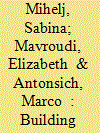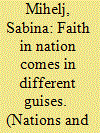| Srl | Item |
| 1 |
ID:
152443


|
|
|
|
|
| Summary/Abstract |
Nation and diversity are often cast in oppositional terms. The present joint intervention explores the limits and possibilities of what we call ‘inclusive nation’, i.e. a nation which embraces rather than expunging diversity. To reflect on this idea, the Loughborough University Nationalism Network (LUNN) organized a symposium, bringing together both academics and relevant stakeholders, to explore both theoretically and practically the feasibility of the inclusive nation. For reason of space, here we present only the theoretical views of academics. While Billig and Yuval-Davis highlight the inherent exclusive thrust of nationalism, Kaufmann and Hearn suggest two distinct ways to move away the traditional understanding of nationalism as a site of singularity, oppression and exclusion. A final rejoinder by Nyhagen pushes the debate further interrogating the boundaries of national belonging.
|
|
|
|
|
|
|
|
|
|
|
|
|
|
|
|
| 2 |
ID:
076752


|
|
|
|
|
| Publication |
2007.
|
| Summary/Abstract |
Many scholars of nationalism seem to assume that religious nationalism is inherently and necessarily hostile to the secular nation-state and to modern developments in general. The present paper challenges this conviction by drawing on recent debates among sociologists of religion, and it points to the existence of modernist versions of religious nationalism that acknowledge the legitimacy of the secular nation-state and are generally sympathetic to modern developments. It examines one of the most prominent manifestations of this variety of nationalism, namely Protestant modernist nationalism. After a brief consideration of cases from nineteenth century Europe, the remainder of the paper focuses on the modernist religious nationalisms arising in post-Cold War Eastern Europe, with a special focus on Slovenia.
|
|
|
|
|
|
|
|
|
|
|
|
|
|
|
|